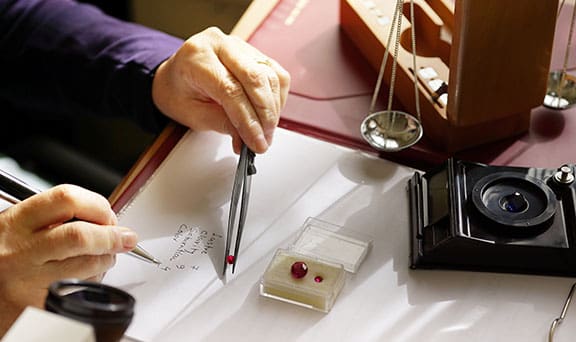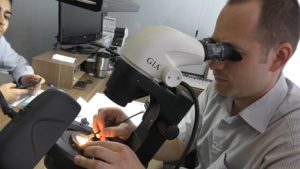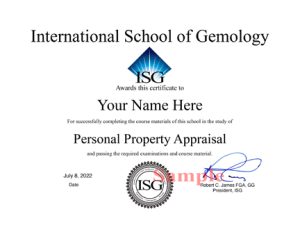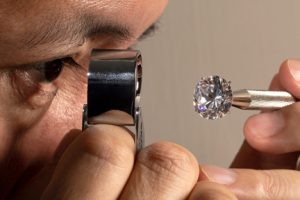
Personal Property Appraisal Course

Overview:
Completing the Personal Property Appraisal course will provide you with an education in establishing a successful jewelry appraisal business. Included are topics such as your legal responsibilities, how to set up your office, how to format your appraisal document, and even how to deal with the insurance agent and adjuster. We also cover working with other professionals such as lawyers and investigators in other areas of property appraisal.
This course was originally certified by the Texas Department of Insurance as Jewelry Insurance 101 for Continuing Education for General Lines. This course credit can be applied to the ISG Registered Gemologist Appraiser Program.
 Instructor:
Instructor:
Your instructor is Robert James FGA, GG. Mr. James is a Fellow of the Gemmological Association of Great Britain, Graduate Gemologist of the Gemological Institute of America, and former Certified Gemologist of the American Gem Society. He is a state licensed Property and Casualty Insurance Adjuster with 50 years of experience in jewelry related litigation and expert witness work in the United States and Europe. He has served as an expert witness and litigation consultant in U.S. State and Federal Courts, as well as in the United Kingdom. He holds a Business Law Certification from Cornell Law School and is a former Senior Gemologist and Special Investigations Unit (SIU) investigator with USAA Insurance.
- Instructor Email Contact: studentinquiry@schoolofgemology.com
- Instructor Phone Contact: (001) 210-464-1473
Course Description:

The purpose of this course is to provide a complete education in the proper format, structure, content, and valuation of jewelry as personal property. The student will learn how to establish and market their own appraisal service. The student will learn how to develop a proper appraisal form that can be used in virtually any requirement, from insurance replacement to probate, estate, and more. This course has been designed by many insurance professionals from the areas of underwriting, adjusting, claims litigation, and special investigations unit. Through this course, students will learn the legal and ethical standards required for a proper jewelry appraiser and how to perform professional appraisal duties in a variety of disciplines, as outlined below.
The course is comprised of 17 parts:
Section 1: INTRODUCTION: An overview of the course and the study of personal property appraisal.
Section 2: TERMS AND DEFINITIONS: To assist the student in understanding the required insurance and other industry terms that will be encountered in their professional careers.
Section 3: YOUR LEGAL RESPONSIBILITIES: Covers the legal requirements of offering appraisals
Section 4: ESTABLISHING YOUR APPRAISAL SERVICE: Provides quality assistance to help the student get their appraisal service started and successful.
Section 5: PROFESSIONAL FEES: With a complete outline of types of fees and fee structure.
Section 6: PROMOTE YOUR SERVICES: Important marketing techniques that have proven successful.
Section 7: UNDERSTANDING THE INSURANCE POLICY: A complete overview of the insurance policy and how the appraisal is integral to the insurance contract.
Section 8: APPRAISAL OF PERSONAL PROPERTY: The important lesson to teach appraisal of personal property.
Section 9: EVALUATION AND DOCUMENTATION: A study of the structure of the proper appraisal document.
Section 10: INSURANCE REPLACEMENT VALUE: Understanding the variables in valuation based on the insurance policy and other factors.
Section 11: ESTATE AND PROBATE APPRAISAL: Appraisers often perform important duties that vary from insurance appraisal.
Section 12: DIVORCE AND BANKRUPTCY: Crucial in the current economy, this form of appraisal is in high demand.
Section 13: DONATION AND CHARITY: Careful consideration should be made regarding the IRS law that we cover in this section.
Section 14: HYPOTHETICAL AND CONSUMER VERIFICATION: When they are required and proper, and how to perform them.
Section 15: MEDIATION AND ARBITRATION: How to handle the situation when your appraisal is challenged.
Section 16: OFFICE SECURITY: Important final steps to secure your office and documents in a cost-effective manner.
Section 17: APPRAISER RESOURCES: Important resources to help you start your career as a personal property appraiser.

Certificate and Badge Awarded: Upon Successful completion of this course you will earn the Certificate for Personal Property Appraisal, and be awarded the Appraisal Certified badge for your website.
Prerequisite Requirements:
Students enrolled in this course must have one of the following:
- Successful completion of a recognized gemological education program from an accepted education organization that includes jewelry appraisal training and/or
- Have graduated or are currently enrolled in a recognized gemology education program with a completion date within the next 3 months and/or
- Have been active in the jewelry industry on a retail or wholesale basis for at least 10 years performing evaluations and appraisals of jewelry and gemstones.
Furthermore, students should have a good working knowledge of computers, have a professional level of writing and organizational skills, top level communication skills, and are prepared to present themselves in a professional manner as required for appearance in the legal proceedings.

Requirements and Assessment Overview
This course will operate based on the following presentations, assignments, and examinations.
- Course materials will be presented in a combination of written notes, video presentations, and interactive participation exercises. Students must also perform outside research for report writing and document preparation. Exams will be placed throughout the lessons to test student understanding of the material.
- Grading will be based on a cumulative point system with 50% of the points coming from satisfactory completion of the assignments and projects, and 50% from the final exam.
- Students will work at their own pace through the online format.
Required Resources
Students will be required to have a laptop, pad, or desktop computer to complete the program due to the immersive structure of the assignments. Adobe PDF Reader and graphics capabilities will be required for the course study. No outside textbooks will be required, although suggested reading resources will be given throughout the course. The average time to complete this course is 8 weeks, depending on the student work schedule and average of 6 hours of study time per week.
Policies of this Course
The registration period for this online course is 4 months. Students are expected to complete all coursework within this time period. Students unable to complete due to a recognized life event may apply for a time extension. All time extension requests will be considered based on the student’s progress to the date of request and other factors at the instructor’s sole discretion. Once the 4-month registration period has expired, no extension will be granted.
Qualified students may start this course anytime and study at their own pace. The ISG reserves the right to request confirmation of student credentials and work experience at any time during the registration term.
The student will be given a 3-day grace period in which to request a full refund for tuition paid. No further review is allowed after this 3-day review period, and the student agrees to not attempt any credit card chargeback or refund on their tuition.
Please read the Student Registration Contract Here: Student Registration Contract
Please contact the International School of Gemology for any questions, suggestions, or inquiries about this course.
Personal Property Appraisal
Introduction
Jewelry Appraiser. The name conjures up someone who has a lot of training, knowledge, experience, and certifications. In reality, there are no legal requirements that prevent you from becoming and/or operating as a jewelry appraiser today.
WHAT?
That’s right. There are no state or federal license requirements for you to follow. No state examinations. No organizations to join. And no formal education required. So why, you may be asking, are you taking this course?
Well, there is a simple answer to that which comes in two parts.
- There are legal responsibilities and exposures that you subject yourself to when you hold yourself out as an expert in the field of jewelry evaluation, and
- More and more insurance companies are requiring consumers to search out a jewelry appraiser with certain proven qualifications in order to avoid some of the problems that are plaguing the insurance industry.
Legal Responsibilities
In spite of the fact that there are no legal requirements for you to have any kind of license, pass any kind of test, or be a member of any formal appraisal organization, there are legal requirements for you to issue documents of evaluation and appraisal that will be used for a consumer to obtain insurance coverage. This stems from the fact that it will be the quality of your work that may one day be used to settle an insurance claim. It may be the quality of your work that is carefully examined by a court room full of lawyers in case there is a dispute regarding an insurance claim. In the event you are found to have made a mistake that caused either party to suffer a loss, it will be you that is going to be legally liable for the damages. While there may not be any legal licensing requirements for you to become a jewelry appraiser, there are many very important legal ramifications to your performing that professional work, and you will need to be very aware that everything you write or say regarding the evaluation of a jewelry item may end up in a court of law.
We will cover your legal responsibilities more in depth in Lesson 2.
Insurance Company Requirements
For many years the insurance companies who underwrite personal property claims (those are the claims under which most jewelry is filed) were willing to take appraisals from just about anyone who had been in the jewelry business for a few years. In fact, the only requirement to issue appraisals was to have a form and be in the business.
The problems really started in the early 1980’s with the advent of the 50% off discount chains that became rampant in the industry. While the prices were inflated just so the store could appear to be offering discounts, the problems occurred when those same stores started giving out “insurance replacement appraisals” that were listed at the same high price as the inflated price tag.
This caused people to get insurance policies that were far and beyond the actual value of the true replacement value of the jewelry item. When one of these items was lost and a claim filed, the insurance company would usually pay the actual replacement cost of the item and not the inflated appraisal cost. This, of course, caused great problems for all.
But the real problem came around when the insurance companies started looking to require that the jewelry appraisals represent the actual value of the item and not some inflated sales pitch. Then, it was realized that there is no control over who does an appraisal. No licensing and no legal requirements…as there are for a real estate appraiser, for instance, and no way to control who or how a jewelry appraisal is done.
As a result of this situation the insurance companies started requiring that appraisers have a certain level of expertise in order for their appraisal documents to be accepted. While this is still not the industry standard by any means (there are many insurance companies who will still accept an appraisal from just about anyone in the business) it is still the direction that the industry is going…mainly in an effort to require some sort of quality control on the appraisals being accepted for coverage.
There are a lot of appraisal courses out on the market today. But most are written by appraisers from venues other than jewelry and gemology. In other words, you have people that are perhaps real estate appraisers, or they may be appraisers of various types of commercial property, and they are the ones writing the courses for the appraisal organization. Often times, the information does not particularly apply to jewelry insurance issues. That is why this course is going to be so important because we’re going to offer you an appraisal course that is based on actual insurance cases, actual insurance claims, and information that is coming directly from the insuring of personal property items of jewelry, gemstones, watches, and related items.
https://schoolofgemology.com/Presentation1b/index.html
Now, you may be asking how this course is going to be different. The main difference in this course and the other courses that you may have seen from the appraisal organizations is going to be that this course is written by people with actual experience in the insurance industry, working inside the jewelry insurance industry. The key here is that you’re going to be getting information from licensed property and casualty insurance adjusters, some of whom also happen to be GIA Graduate Gemologists, and Fellows of the Gemmological Association of Great Britain. Therefore, this is the first time that an appraisal course for the jewelry industry has been developed not by an appraisal association and not by people who are appraisers in other types of merchandise, but rather by people who have actually worked inside the insurance industry, are licensed by the insurance industry, and who also hold the credentials of the jewelry and gemstone industry. I think we are going to have something very special to offer you here, and I think it’s going to be an enjoyable look inside the insurance industry. Plus, it will be an opportunity to learn not what some appraisal organization says that you should be doing for appraisals, but what the actual insurance industry says you should be doing for appraisals. This is going to be a very important course for you, and it will certainly offer information that is going to make your position as a jewelry appraiser much more in demand by the insurance industry.
During this course we are going to look at all aspects of being a jewelry appraiser, including some of the other types of appraisal you may be asked to perform. These include estate appraisal, probate appraisal, bankruptcy appraisal and more. What we want to do here is take you from the very first step of becoming a registered jewelry appraiser with the ISG, to being able to establish your own office as a recognized jewelry appraiser within the industry. In order to do this, we need to start from the basic understanding of your legal responsibilities as a jewelry appraiser, and then go into how to establish yourself with an appraisal office which will include the equipment you need, the forms you need, the type of presentation you need, and a way to establish yourself within your community. We will go through the concepts of insurance and see what a homeowner’s policy contains, what kinds of coverage you need to learn, and how to write an appraisal in a manner that will protect your client’s interests in the event of a loss.
Then we will look at the various other types of appraisals and show you how these differ from the insurance appraisal and how different rules can apply to each based on their different requirements.
Finally, you will have certain responsibilities to your clients as far as maintaining records and being available to serve as an expert witness and consultant after the fact of your appraisal. You will need to understand that by holding yourself out as a qualified jewelry appraiser, you will have certain legal responsibilities that will extend beyond the actual appraisal itself. In other words, the appraisal that you write is not just a document that you’re going to give to somebody that they in turn use in any type of cause of action…and that’s the end of it. That will not be the case at all.
As an ISG Registered Gemologist Appraiser you will be expected to maintain archives of your appraisal documents for at least seven years. You will also be expected to be able to retrieve those appraisal documents and be available for professional consultation at any time. You will not only want to maintain a professional office environment, but you also need to maintain a long-term document protection area. More importantly, an archive that is of quality so that you can pull up an appraisal that may be several years old and be able to speak clearly to the insurance company, attorney or perhaps a court of law about what your evaluation found several years ago.
That will be the purpose of this course. To take you through the entire process of establishing yourself and your office as a professional appraisal provider and being able to protect yourself legally regarding your responsibilities. It will also be to help you establish and maintain your professional standing within your community as a properly trained and professional jewelry appraiser with the training and knowledge to perform many types of appraisal.
Our first step in this course is going to be looking at some terms and definitions that are from the insurance industry. These are insurance terms that have to do with establishing the coverage contained within an insurance policy. They deal with coverages, limitations, declarations, and exclusions regarding the jewelry items you’re going to be appraising. You need to know these terms and definitions in order to communicate properly through your appraisal document, and to be able to properly communicate with the other professional members of the insurance industry.
Before we get into how to establish yourself as an appraiser let’s first take a look at some insurance terms and definitions so you can better understand your profession as a jewelry insurance appraiser.
